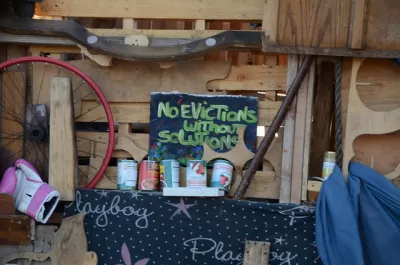A survey of renters' housing history in Milwaukee could completely change what we know about eviction in the United States.

A study spearheaded by Harvard sociologist Matthew Desmond, author of Evicted: Poverty and Profit in the American City, indicates that eviction may be far more common than previously thought.
For one, FiveThirtyEight reports, the Milwaukee Area Renters Study (MARS) found that formal evictions—those involving a court order—accounted for only 24 percent of all forced moves in the region. By contrast, informal evictions—in which, for example, landlords "give a tenant $200 to move out by Thursday" or simply "take the door off"—made up 48 percent.
There's more—a lot more:
Desmond’s follow-up research using MARS data has found a strong connection between eviction and subsequent residential instability, even after factoring in the tenant’s income and race. Eviction is linked to substandard housing conditions. And eviction also has serious negative health consequences, particularly for children.
Eviction also has a racial and gender bias: “Among renters, over one in five black women report having been evicted sometime in their adult life,” Desmond has found.
While the study was limited to the Milwaukee area, it yielded so much more information than current federal practices that the Census Bureau is hoping to incorporate it into the biennial housing survey. In fact, FiveThirtyEight writes that it "may be the first rigorous, detailed look at eviction in a major city."
Its success can be attributed to its careful design. In interviews with more than a thousand local tenants over three years, researchers avoided language with specific formal connotations—like “eviction”—and instead asked people to describe their actual experiences.
The MARS researchers found that when people were forced to move, they often didn’t see it as an eviction. So instead of just asking, “Have you ever been evicted?” the MARS survey posed a roster of questions about a tenant’s housing history — when and where they had lived and why they left. This “moving module” was the centerpiece of the MARS study.
FULL STORY: How We Undercounted Evictions By Asking The Wrong Questions

Planetizen Federal Action Tracker
A weekly monitor of how Trump’s orders and actions are impacting planners and planning in America.

San Francisco's School District Spent $105M To Build Affordable Housing for Teachers — And That's Just the Beginning
SFUSD joins a growing list of school districts using their land holdings to address housing affordability challenges faced by their own employees.

The Tiny, Adorable $7,000 Car Turning Japan Onto EVs
The single seat Mibot charges from a regular plug as quickly as an iPad, and is about half the price of an average EV.

Seattle's Plan for Adopting Driverless Cars
Equity, safety, accessibility and affordability are front of mind as the city prepares for robotaxis and other autonomous vehicles.

As Trump Phases Out FEMA, Is It Time to Flee the Floodplains?
With less federal funding available for disaster relief efforts, the need to relocate at-risk communities is more urgent than ever.

With Protected Lanes, 460% More People Commute by Bike
For those needing more ammo, more data proving what we already knew is here.
Urban Design for Planners 1: Software Tools
This six-course series explores essential urban design concepts using open source software and equips planners with the tools they need to participate fully in the urban design process.
Planning for Universal Design
Learn the tools for implementing Universal Design in planning regulations.
Smith Gee Studio
City of Charlotte
City of Camden Redevelopment Agency
City of Astoria
Transportation Research & Education Center (TREC) at Portland State University
US High Speed Rail Association
City of Camden Redevelopment Agency
Municipality of Princeton (NJ)





























